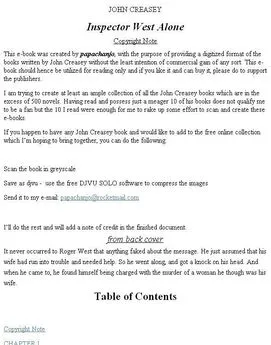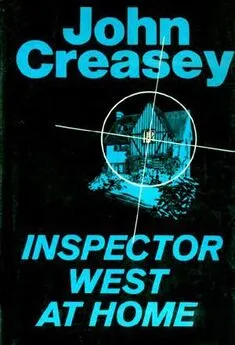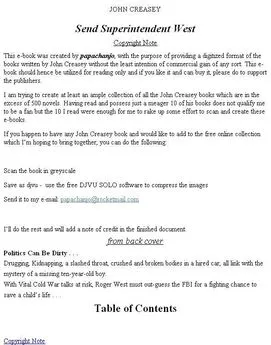John Creasey - Inspector West Alone
- Название:Inspector West Alone
- Автор:
- Жанр:
- Издательство:неизвестно
- Год:неизвестен
- ISBN:нет данных
- Рейтинг:
- Избранное:Добавить в избранное
-
Отзывы:
-
Ваша оценка:
John Creasey - Inspector West Alone краткое содержание
Inspector West Alone - читать онлайн бесплатно полную версию (весь текст целиком)
Интервал:
Закладка:
Chatworth nodded.
“Although he seemed bitter about it, I couldn’t make him talk freely. But I did discover that one thing frightened him—the possibility that his daughter, who lives in France, should discover the truth about him. The daughter’s name was Lucille. We always thought that a French girl was killed at Copse Cottage, if you remember.”
“There are other French names,” Chatworth said.
“I know, sir, but—well, remember the whisper that a Kennedy was involved both in the Copse Cottage job and West’s kidnapping. We’ve been looking for a French girl, and among the missing people reported at our request by the Paris Sûreté there was a Lucille Dinard. Just following that line, sir, I slipped over to Paris when I had a week-end off not long ago. I discovered that this Lucille was really English, but I couldn’t find out the English name she had before she went to live with this uncle and aunt in Paris. My French isn’t very good, and the Sûreté man who was with me wasn’t very interested. I just let it seep into my mind, sir, and watched Kyle. A month after he’d visited Rayner—the Kennedy contact—he fell under a train at Edgware Road. Someone told the police that he’d been pushed, but wouldn’t swear to it at the inquest. The coroner had a lot to say about vivid imaginations, and the verdict was accidental death. Like that on Kyle’s wife, some months ago. I checked, and Kyle had Rayner’s telephone number on a slip of paper, as well as a name—John Pearson—and a Strand post-restante address. There was a letter containing ten pounds at the Strand Post Office, waiting for Pearson, so someone was staking him.”
Chatworth rubbed his round, red nose and grunted.
“Then another queer thing happened—a girl named Marion Day was killed in a street accident. It all seemed normal enough, but I had an obsession about street accidents on this job, and spent a lot of time checking them. I couldn’t cover them all, but I had a bit of luck with Marion Day. She was killed in a stretch of Kensington High Street which is usually free from accidents—I investigated all of those in the accident-free parts, it narrowed the line of inquiry. When found, she had a telephone number in her possession—the number of the Kennedy contact whom Kyle had gone to see. That made three accidents, all connected with Kennedy. It was still vague, but I spent some time checking on this girl Day. She’d worked at a nursing home—a private asylum, really. They dealt in schizophrenic cases. The home was closed down a few days after Marion Day was killed. The doctor and staff vanished, and very little was known about them. There was no list of the staff, no record of the doctor in charge—named Ritter—in medical or surgical lists. But I spent a few odd hours up there—it’s near Worcester—and managed to find an old man who’d worked in the garden. He didn’t know much, never went inside the house, was paid by a member of the staff whose name he didn’t know. But he told me that a Mr. Kennedy often called there until a couple of months ago—he knew, because Marion Day occasionally had a talk with him, and once or twice she’d said she was expecting Mr. Kennedy. Now, he said that Marion Day had a special patient. She took him for a walk round the garden once, and—well, the gardener wouldn’t swear to it, but he thought it might be West. The gardener remembered being called away from the back garden on the occasion when he saw this patient. I showed him photographs. Slipped up, I’m afraid, sir—instead of giving him a selection to choose from, I let him see just West’s. Even then, he wasn’t sure, but he was sure about the name Kennedy. And this patient was at the nursing-home immediately after the Copse Cottage murder. As I’ve said, the nursing-home closed down after the death of Marion Day.”
Chatworth grunted; that might mean anything.
“So I had another go at Rayner, tried to get him to admit that he knew Kennedy and Marion Day and Kyle. I didn’t get anything out of him. I don’t rate him as a bad man— that doesn’t mean he isn’t one, some cover it well, but I doubt if he’s a professional crook. I saw him yesterday. Late last night I had a mysterious telephone message, warning me that I was likely to meet with an accident— that rang a bell, all right!—and also giving me an interesting piece of information. The man said that if I wanted to find the identity of the Copse Cottage victim, I ought to try 23 Rue de Croix, Paris 8. That’s the address of the Lucille Dinard whose relatives I went to see. As a result——”
Chatworth said heavily: “You want protection as well as official support for your line of inquiry, men to work with you, and—you’d like to carry a gun, wouldn’t you?”
“That’s about it, sir. I know that we’ve often had a lot of vague stuff like this to work on before, and I can’t say that until last night I could see any reason for concentrated effort on the job, but now——”
“Who’d you want with you?”
“Detective Sergeant Peel.”
“All right. Make an official report of the threat against your life, an official application to carry firearms until further notice, and see if Peel can be freed for a week. Week long enough?”
“We ought to get something by the end of it, if there’s anything to get.”
“All right, try.”
* * * *
Peel was eight years younger than Sloan, and in appearance, might have been his brother. He was also a protégé of Roger West. He was free for the job.
* * * *
At the top of the steps, Sloan said to Peel :
“I’ll go by bus to the Ritz, then walk along to Hyde Park Corner and down Grosvenor Place. You take a car and be waiting at the Ritz. Follow me. If I’ve been followed, I’ll tip my hat on to the back of my head. Right?”
“Right.” Peel was eager.
Sloan went briskly down the steps of the Yard, along past Cannon Row police-station, thence to Parliament Street. A small car, parked near Parliament Street, moved after him. It was a Morris, shabby and muddy grey, and the registration number was XA 124. Sloan boarded a bus and found a seat in a place where he could watch the road behind him. The muddy grey Morris followed. Something about it touched a chord in his memory. He rubbed his chin, and tried to think why. “Muddy” and “grey” were the words which mattered. He glanced at the Daily Cry which he carried—there were front-page headines about the Delaney escape from Brixton. Ah! “ The police are anxious to obtain information about a small muddy grey Austin or Morris four- seater car seen near the entrance to Brixton Jail about the time of the escape. A man was at the wheel, and a young woman passenger beside him. Information should—— ”
Sloan said aloud: “I believe in coincidence, but not in miracles!” He shrugged the suspicion aside.
The car slowed up in front of the bus when he got off. A passenger climbed out, a small, nondescript man, dressed in navy blue, wearing a trilby hat with a wide brim. Sloan walked briskly past the bus stop and along by Green Park. Chairs were dotted about the grass, a few people were strolling about beneath the watery sunlight. Traffic streamed towards Hyde Park Corner, but the muddy grey Morris stayed where it was for a few minutes, and the nondescript little man followed Sloan. Sloan tipped his hat on to the back of his head, but didn’t look round to see if Peel were following: Peel would be.
Sloan passed the gates of Green Park, hesitated on the kerb and looked at the square mass of St. George’s Hospital. He seemed to change his mind about crossing, and stepped out briskly down Grosvenor Place. His man and the little car also followed—the car never more than twenty yards behind him.
Quite suddenly, Sloan stepped into the road.
He had hardly touched the roadway before the engine •of the Morris roared and the car leapt forward.
CHAPTER XIX
JANET
TWENTY yards wasn’t far.
Unwarned, Sloan wouldn’t have stood a chance. The driver of another car, who was just pulling out to pass the Morris, jammed on his brakes and started to skid. The muddy grey Morris turned towards Sloan, but couldn’t touch him without causing a crash. The driver straightened the wheel. The car didn’t slow down. It flashed past Sloan, who was in front of the other car, which had stopped inches away from him. The driver, opening his door, was white with fright.
Peel’s dark car flashed by.
The man in the navy-blue suit stood on the kerb for a few minutes, then suddenly turned and hurried back towards Hyde Park Corner. All he’d done was walk along the pavement, there was nothing Sloan could do about him. The driver of the car which had nearly touched Sloan shouted:
“You ruddy fool! Serve you right if you’d caught a packet. How I stopped I don’t know. It’s idiots like you that cause the trouble. You’re lucky to be alive.” The words came out in a furious spate, and Sloan straightened his coat and tried to speak, but wasn’t given a chance. Passers-by joined in, all on the side of the driver.
“. . . ought to be given in charge, walking across the road like that. I’ve a good mind——”
“Yes, sorry,” said Sloan. “It was my fault.” He took out his card.
“I should damn well think it was your fault. Only a fool or a drunk would do that! Don’t stick your card in front of my nose.” The driver waved it away.
“I thought I saw a man I was after,” Sloan said. “I’m from the Yard.”
“I don’t care where you come from, if—where did you say?” The scared blue eyes dropped to the card, everyone else stopped talking. “Oh, the Yard.”
“Yes, I’m after a man and thought he was over here. I didn’t see you coming. Sorry.”
“Well——”
It was ten minutes before Sloan, transformed from villain to hero in the space of seconds, was able to get away. He took a taxi back to the Yard, and the first job he did was to write an official report of the incident, a description of the man who had left the car, and of the car itself. He made a special note: “Check with Brixton job”, and then went on with routine work, on edge for a call from Peel.
The telephone bell rang.
He snatched off the receiver. “Yes?”
“Peel here,” said Peel. “I’m glad you’re all right, I thought you’d gone bang into the other car.”
“Trail him home?”
“Yes,” said Peel. “A boarding-house in Chelsea. I’m at the Chelsea Station. Better just have him watched, hadn’t we?”
“Your job,” said Sloan, “and keep it quiet.”
“After this morning’s dose, you oughtn’t to travel much on your own.”
“Don’t worry about me,” said Sloan. “You just concentrate on that man. Where’s the car?”
“Outside the boarding-house.”
“Ask the Chelsea people to find out where it was last night—trace the garage, everything. Muddy and grey— does that mean anything?”
“Crikey! Brixton!”
Sloan laughed; he felt on top of the world.
He was still feeling on top of the world when the telephone bell rang again. He let it ring, but it wouldn’t stop. He finished a note and lifted the receiver. “Hallo . . . oh, hallo, Mark.”
His voice changed, and he came off the top with a bump. Mark Lessing made him think immediately of Janet West.
“Anything?” asked Mark briefly.
“I wish there were.” It was all right to use Lessing unofficially, impossible to tell him anything on this telephone, unwise to say anything that would raise Janet’s hopes. “How is she?”
“Not too good,” said Mark Lessing. “She’s convinced that the Yard has completely forgotten about it. Anything you can do to cheer her up a bit?”
Читать дальшеИнтервал:
Закладка:










